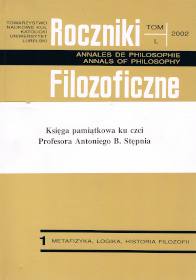Odmiany emergencji w zastosowaniu do ontologii umysłu
Abstrakt
Emergentism is (a) an ontological doctrine about how the phenomena of this world are organized into autonomous emergent levels and (b) a metascientific thesis about the nature of relationship between basic physics and special sciences (such as biology, psychology and sociology). Claims involving emergent properties (laws and regularities) are now rife in discussions of non-linear dynamics, connectionist modelling, chaos theory, complexity studies and ontology of mind. According to R. Spencer-Smith there are three major concepts of emergence, which might be termed: (a) epistemic emergence, (b) interactional emergence, and (c) radical emergence. The author of the paper distinguishes and discusses two kinds of radical emergence − autocreational and actualizational emergence. The second notion leads directly to a form of dual-aspect theory in ontology of mind. In this case the notion of a causally closed (purely) physical world makes no sense because even micro-events have proto-mental properties. A metaphysical theory of this sort provides a conceptually coherent middle road between Cartesian dualism and materialist monism.
Bibliografia
Beckermann A. (1992), Supervenience, Emergence, and Reduction, w: Beckermann, Flohr, Kim (eds.), Emergence or Reduction?, s. 94-118.
Beckermann A., Flohr H., Kim J. [eds.] (1992), Emergence or Reduction? Essays on the Prospects of Nonreductive Physicalism, Berlin−New York: Walter de Gruyter.
Brüntrup G. (1998), Is Psycho-Physical Emergentism Committed to Dualism? The Causal Efficacy of Emergent Mental Properties, „Erkenntnis”, 48, s. 133-151.
Campbell D. T. (1974), Downward Causation in Hierarchically Organized Biological Systems, w: Studies in the Philosophy of Biology, eds. F. J. Ayala, T.Dobzhansky, Berkeley−Los Angeles: University of California Press, s. 179-186.
Coveney P., Highfield R. (1997), Granice złożoności, tłum. P. Amsterdamski, Warszawa: Prószyński i S-ka.
Ditfurth H. von (1985), Nie tylko z tego świata jesteśmy. Nauki przyrodnicze, religia i przyszłość człowieka, Warszawa: PAX.
Goudge T. A. (1967), Emergent Evolutionism, w: The Encyclopedia of Philosophy, ed. P. Edwards, vol. II, New York−London, s. 474-477.
Haldane J. (1996), The Mystery of Emergence, „Proceedings of Aristotelian Society”, 96, s. 261-267.
Hempel C. G., Oppenheim P. (1948), Studies in the Logic of Explanation, „Philosophy of Science”, 15, s. 135-175.
Hempoliński M. (1989), Filozofia współczesna. Wprowadzenie do zagadnień i kierunków, Warszawa: PWN.
Kałuszyńska E. (1998), Uwagi o redukcjonizmie, „Filozofia Nauki”, 6, nr3-4(23-24), s. 35-45.
Kim J. (1999), Making Sense of Emergence, „The Philosophical Studies”, 95, s.3-36.
Kekes J. (1966), Physicalism, the Identity Theory, and the Doctrine of Emergence, „Philosophy of Science”, 33, s. 360-375.
Levine J. (1983), Materialism and Qualia: the Explanatory Gap, „Pacific Philosophical Quarterly”, 64, s. 334-361.
Lorenz K. (1977), Odwrotna strona zwierciadła, tłum. K. Wolicki, Warszawa: PIW.
Meehl P., Sellars W. (1956), The Concept of Emergence, w: The Concept of Psychology and Psychoanalysis. Minnesota Studies in the Philosophy of Science, vol. I, eds. H. Feigl, M. Scriven, Minneapolis: University of Minnesota Press, s. 239-252.
MaynardSmith J. (2000), The Concept of Information in Biology, „Philosophy of Science”, 67, s. 177-194.
Metallmann J. (1938), Determinizm i pojęcie emergencji w biologii, „Przegląd Filozoficzny”, 41, s. 45-53.
Nobis A. (1999), Od emergencji do samoorganizacji. Zagadnienie nowości kultury, Wrocław: Wydawnictwo Uniwersytetu Wrocławskiego.
O'Connor T. (1994), Emergent Properties, „American Philosophical Quarterly”, 31, s. 91-104.
Piątek Z. (2000), Przetwarzanie informacji w świetle teorii ewolucji, w: Filozofia i logika. W stronę Jana Woleńskiego, red. J. Hartman, Kraków: Wydawnictwo Aureus, s. 243-254.
Prigogine I. (2000), Kres pewności. Czas, chaos i nowe prawa natury, tłum. I. Nowoszewska, Warszawa: Wydawnictwo CiS.
Scott A. (1999), Schody do umysłu, tłum. H. Barańska, Warszawa: Wydawnictwo Naukowo-Techniczne.
Searle J. (1999), Umysł na nowo odkryty, tłum. T. Baszniak, Warszawa: PIW.
Silberstein M., McGeever J. (1999), The Search for Ontological Emergence, „The Philosophical Quarterly”, 49, s. 182-200.
Spencer-Smith R. (1995), Reductionism and Emergent Properties, „Proceedings of Aristotelian Society”, 95, s. 113-129.
Stephan A. (1992), Emergence − A Systematic View on its Historical Facets, w: A. Beckermann, H. Flohr, J. Kim (eds.), Emergence or Reduction?, s. 25-48.
Strawiński W. (1997), Jedność nauki, redukcja, emergencja, Warszawa: Fundacja Aletheia.
Wojciechowski T. (1980), Z problematyki ewolucyjnej genezy duszy ludzkiej, w: Zarys filozofii przyrody ożywionej, red. S. Mazierski, Lublin: RW KUL, s. 297-320.
Wojciechowski T. (1992), Geneza duszy ludzkiej w ujęciu Kazimierza Kłósaka, „Studia Philosophiae Christianae”, 28, nr 2, s. 127-137.
Wojciechowski T. (1997), Zarys filozofii przyrody ożywionej, Opole: Wydawnictwo Świętego Krzyża.
Copyright (c) 2002 Roczniki Filozoficzne

Utwór dostępny jest na licencji Creative Commons Uznanie autorstwa – Użycie niekomercyjne – Bez utworów zależnych 4.0 Międzynarodowe.





